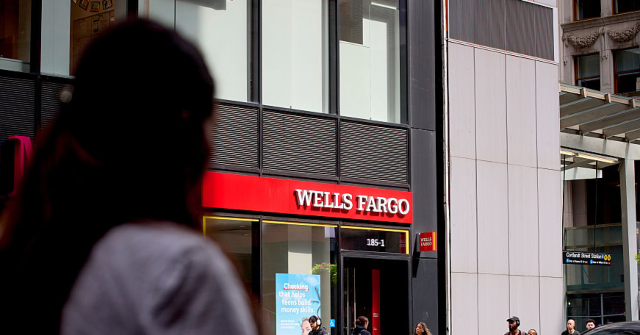Wells Fargo suspended travel for all of its employees to China on Thursday after the Chinese government slapped an exit ban on banker Chenyue Mao.
Mao is an American citizen who was born in Shanghai. She is a managing director for Wells Fargo, working from an office in Atlanta. According to the bank, her duties include helping international companies manage their working capital in different countries.
Mao specializes in “factoring,” the practice of selling accounts receivable to third parties. The seller gets cash immediately, while the buyer or “factor” proceeds to collect on the invoices they purchased at a discount. Companies that do business overseas often find factoring preferable to running debt collections operations in foreign countries.
In June, Mao was elected as chairwoman of FCI, a global industry organization for international accounts receivable. FCI was called Factors Chain International when it was established in 1968, and factoring remains one of its primary interests, but it has diversified into other aspects of finance and debt collection across national borders.
When it announced Mao’s election as chair of its executive committee, FCI noted she had over 21 years of experience with factoring and has worked at Wells Fargo for over a decade. During that time, she was credited with growing “annual import-factoring flows to 2.6 billion euros (over $3 billion in U.S. dollars) while fostering innovation in open-account solutions.”
FCI said her goals as chairwoman included recruiting more banks to the organization and “expanding import-factoring know-how within the network.”
Mao recently took a business trip to China, which appeared to pass without difficulty until she tried to leave, at which point she reportedly discovered Chinese officials had placed an exit ban on her. Her professional history and agenda with FCI might provide some clues, but so far the Chinese government has made no official statement about why she was forbidden to leave the country.
Mao has a long history of working with Chinese corporations and industry groups on trade financing, including factoring, and has traveled to China on business many times in the past, seemingly without incident.
China often puts export bans on travelers who have been accused of a crime. Under China’s grotesque “justice” system, the accused do not always know they are under investigation until they suddenly find themselves unable to travel. This is especially common if the subjects have been secretly accused of jeopardizing China’s national security.
Wells Fargo is not the first international company to cancel travel to China over growing fears of political persecution and mercurial exit bans. The regime in Beijing persists in these alarming practices even as it struggles to convince foreign companies to invest more money in China’s faltering economy.
Bloomberg News on Friday quoted a 2022 study that found 128 cases of foreign citizens who were banned from leaving China. At least a third of those cases were “driven by business disputes.”
Wells Fargo and FCI have both been reluctant to discuss the details of Mao’s business trip, or speculate on the reason she was banned from leaving the country, possibly because they wish to avoid antagonizing Chinese officials while Mao remains in their clutches.
“We’re closely tracking this situation and working through the appropriate channels so our employee can return to the United States as soon as possible,” Wells Fargo said in a statement distributed by email.
The U.S. Embassy in Beijing also preferred not to discuss the case, although it acknowledged that exit bans are a problem the embassy is often called upon to deal with.
“We have raised our concern with Chinese authorities about the impact arbitrary exit bans on U.S. citizens have on our bilateral relations and urged them to immediately allow impacted U.S. citizens to return home,” the embassy said.
A senior Trump administration official told Reuters on Friday that “privacy considerations” precluded a detailed comment on Mao’s situation.
“The Chinese government has, for many years, imposed exit bans on U.S. citizens and other foreign nationals in China, often without a clear and transparent judicial process for resolution,” the administration official added.
Chinese officials mumbled platitudes about how foreigners and their money are welcome on China’s totally safe and not-at-all dystopian soil, while claiming to have no idea why Mao was prevented from leaving the country.
“As principle, China always welcomes foreign citizens, including those of the United States, to come to China and guarantees their safety and legitimate rights and interests in China in accordance with the law, including freedom of entry and exit,” Chinese embassy spokesman Liu Pengyu told the New York Post.
“Meanwhile, foreign citizens in China should also respect and abide by Chinese laws,” Liu added ominously.
Chinese Foreign Ministry spokesman Lin Jian claimed to be unaware of the Mao case on Friday, even though it had blown up into major international news by then.
“China upholds the rule of law for anyone in China, Chinese and foreign alike. They need to abide by Chinese laws, and their lawful rights and interests are always duly protected in accordance with the law,” Lin said. The Foreign Ministry apparently forgot to include the question, and Lin’s response, in its official transcript of his press conference on Friday.
Reuters said ripples from Mao’s exit ban are already spreading through the financial community, where the hunger for Chinese money is increasingly balanced by fear of the secretive authoritarian government.
“We do so much business in China and travel there so much, we can’t afford not to. I would hope this is just a one-off,” said an unnamed capital markets banker in Hong Kong.
Read the full article here


